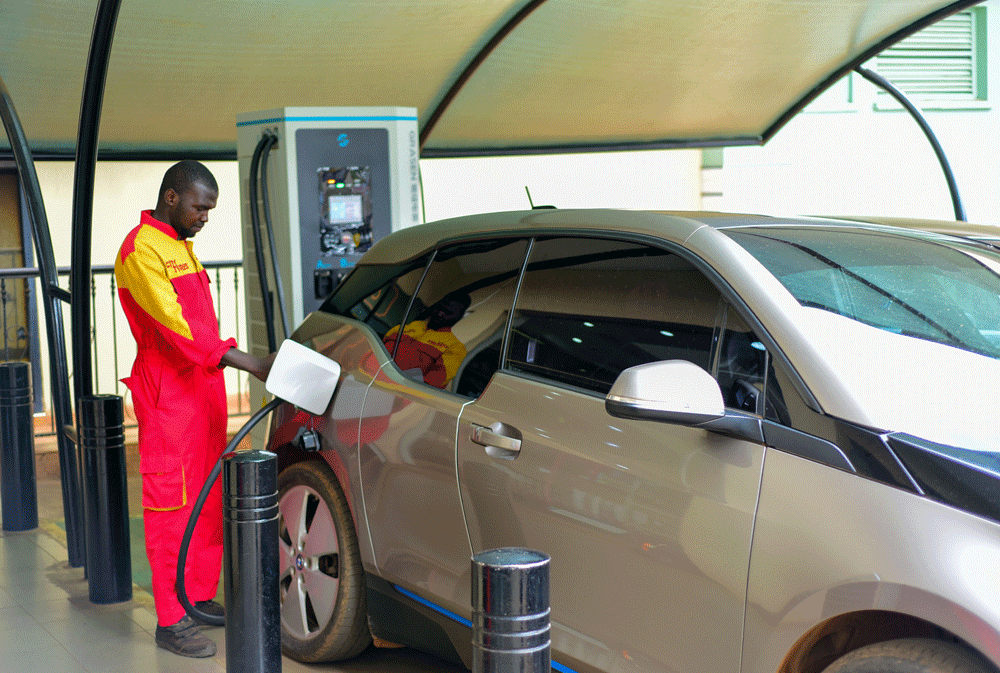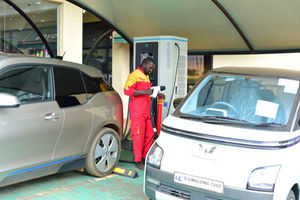
A man at an electric vehicle charging station in Kampala. Electric mobility is crucial for reducing carbon emissions and safeguarding the environment. PHOTO/Michael Kakumirizi
If everything goes as planned, the Electric Vehicle (EV) charging business could be the next major boom in Uganda.
Recent developments, such as installing EV charging stations around the central business district of Kampala, supported by new policies, underscore this potential.
According to Ms Irene Batebe, the Permanent Secretary of the Ministry of Energy, these initiatives are laying the groundwork for private sector investment, a trend that is also being embraced in rapidly growing economies.
For instance, in Kenya, there are more than 40 e-mobility companies involved in manufacturing, importing, and establishing EV charging stations, according to the Africa E-Mobility Alliance (AfEMA), while in Tanzania, AfEMA reports that there are 11 e-mobility companies and around 10 companies engaged in importing, selling, retrofitting, servicing, or charging EVs.
South Africa, in comparison, stands out in Africa for its private sector’s involvement in the EV charging station business, with around 350 EV charge points.
Despite the promising opportunities, Prosper Magazine understands that establishing an EV charging station is an expensive venture, compounded by taxes that discourage the populace from purchasing e-mobility vehicles.
Costs
Like petrol stations, installing an EV charging point can be costly due to several factors, especially equipment costs.
High-quality chargers, particularly Direct Current (DC) fast chargers, are expensive due to their sophisticated components and technology designed for fast and safe charging.
Additional hardware, such as mounting equipment, cabling, and transformers, further increases the cost.
“Each charging station can cost around $15,000 (Shs55.8 million) to $20,000 (Shs74 million), which is quite high, especially in a developing country like Uganda,” adds Mr Musinguzi Samuel, an EV expert.
One factor likely to increase the cost of establishment, according to Mr Musinguzi, is the need for an independent transformer. He explains, “As the business grows, we may face power issues during peak hours when nearly every user is charging simultaneously. So an independent transformer may come in handy, and securing it, a high-quality transformer can cost around $20,000 (Shs100 million).”
Conversely, installation of equipment also requires site preparation which may involve excavation, concrete work, or other construction activities to accommodate the charging station, as well as the specialised electrical work to ensure the system is safe and compliant with regulations which attracts labour costs.
Meanwhile, Mr Musinguzi says government’s reintroduction of import duties on e-mobility at 25 percent this financial year has become a significant obstacle, as it slows down the importation of EVs, which are already expensive to purchase.
‘’We had hoped to see around 1,000 EVs in Uganda within the next five years, but this goal may be delayed,” he says.
A notable but subtle factor to consider is that some electric vehicles come with their own home chargers, which could affect the viability of investing in public charging infrastructure.
Other costs involved include obtaining permits from relevant authorities, maintenance and repairs, lease or rental fees, if any, and, in some cases, software and network fees.
However, industry experts note that the largest expense is the installation costs, because operational costs are relatively minor and easily managed due to the nature of the business.
Ordinarily, EV charging stations operate autonomously—there are no attendants. Customers simply plug in their electric vehicles, adjust the voltage if needed, and make a payment before the charging process begins.
“The initial cost of installing an EV charging station is quite high, but once it is set up, the operational costs are relatively low,” says Mr Musinguzi.
“You do not need staff to manage an EV charging station continuously. Instead, you only need someone to assist with card swiping to enable the machine to process the charging request,” says Mr Musinguzi.
Lucrative business
Industry players and experts predict a lucrative avenue to invest, once a few nuts and bolts and tightened in the interest of all stakeholders, irrespective of the high startup costs.
“Currently, there might be limited returns on investment due to the relatively small number of electric cars. It is a classic “chicken and egg” situation,’’ Mr Musinguzi says.
But, once the market opens up more broadly, he envisions a scenario where a single EV charging point could generate substantial revenue.
If you are considering investing in the business, Mr Musinguzi offers this calculation: “Assuming the regulator, Electricity Regulatory Authority (ERA) sets a tariff of Shs1,500 per kilowatt, and Umeme deducts Shs700 per kilowatt, you would be left with a profit of Shs800 per kilowatt.”
He further explains, “If you handle, the least, 25 EVs, each charging 20 kilowatts, multiply by Shs800 per kilowatt, your gross revenue could exceed Shs400,000 per day, or hours depending on the efficiency of your charging system,” Mr Musinguzi explains.
According to him, high-performance systems can complete a charge in 10 to 25 minutes.
The EV charging business is billed per kilowatt, depending on your vehicle’s battery capacity.
“We are in discussions with ERA to shape our approach for charging fees. Currently, the existing charging stations do not follow a standardised payment system. They measure electricity consumption and charge based on kilowatts used without a commercial framework,” Mr Musinguzi says, but notes that the charges are still lower compared to fueling a car.
Business trajectory
While current investors in the charging business may not see immediate returns due to the limited number of EVs, all indications suggest that efforts are underway to stimulate and grow the business.
Globally, there is a significant shift towards green energy consumption for health and environmental reasons.
Electric mobility, whether embraced now or in the future, represents a key component of reducing carbon emissions and protecting the environment. As such, investments in carbon-neutral mobility hold substantial potential for growth and profitability.
Mr Benon Mascot, deputy general manager of sales and marketing at Motorcare, highlights another promising aspect of the EV business: the strong user attachment to electric vehicles.
“Once someone has used an electric bike for a few months, it becomes very difficult for them to switch back to a conventional bike,” he says, indicating a positive business trajectory.
Governments have invested heavily to jump-start the sector. In Uganda, the government has introduced a set of policies designed to facilitate the commercialisation of the sector and drive its growth.
Ms Batebe anticipates significant market growth driven by the increasing adoption of e-mobility transport solutions, including three-wheelers, boda bodas, and motor vehicles.







